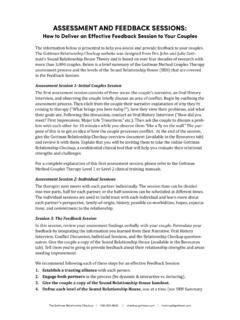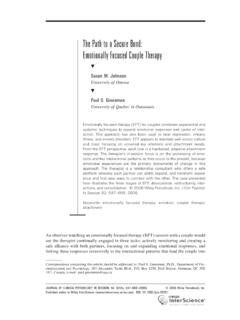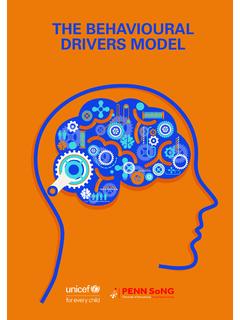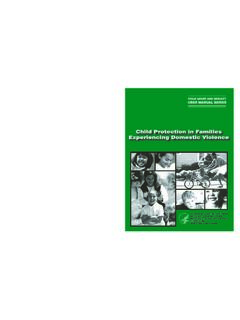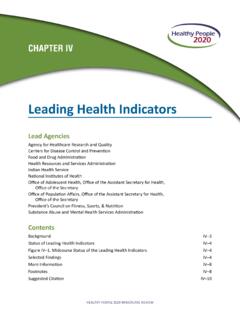Transcription of The Seven Principles for Making Marriage Work. John M ...
1 The Seven Principles for Making Marriage Work. John M. Gottman and Nan Silver - summary Gottman, John; Silver, Nan (1999). The Seven Principles for Making Marriage Work. Crown Publishers imprint (Three Rivers Press). Chapter 1 inside the Seattle Love Lab: the truth about happy marriages This chapter speaks of how John Gottman (et al) made a Love Lab where they studied couples (recorded, physiologically monitored, etc.). The authors devised a 91% successful way of predicting divorce which can be observed with a 5 minute observation! As mentioned, those predictions are based on empirical studies. Gottman claims that often, couples therapy will not work long term because often, the essential ingredients are not tapped into. In emotionally intelligent marriages, a dynamic is established where negative thoughts and feelings are kept from overwhelming the positive ones.
2 Stats: Over 40 year period, 67% of first marriages will break up. Half of divorces occur within the first 7 years. People who stay married live 4 years longer. Bad marriages lead to physiological and psychological stresses, and thus consequences ( increase in: high blood pressure, heart disease, anxiety, depression, suicide, violence, psychosis, homicide, substance abuse). Immune system gets depressed because in divorcees. Heightened marital stress also has an effect on the children s physiology and their behaviours. A peaceful divorce is better than an hostile Marriage . Self-reports are seen by Gottman as erroneous. abused women will indicate that they are happy. But when interviewed one-on-one, in a setting which they feel safe, their agony is revealed. Gottman tries to follow up with his research couples in the long-term.
3 Gottman claims that working on communication and/or conflict resolution does not lead to happier marriages. The commonly advised I statements, active listening , validation and empathy may be helpful, but it is not necessarily the decisive factor in a couple s relationship s improvement. Conflict resolution is not the decisive factor as happily married couples may have a lot of conflict, and may not validate when angry at each other. It is the positive sentiments overriding the negative ones. Myths 1. neurosis or personality problems ruin Marriage : not true: we all have quirks! It is how you deal with them. 2. common interests keep people together: it may or may not be true but it is all in the how you do things together. 3. reciprocity keeps a good relationship: WRONG!!!!! It is reciprocity keeping a tab on things which is BAD for the relationship.
4 Instead: the happy couples just do thing because they feel happy about the relationship. 4. Avoiding conflict will ruin your Marriage : saying tough things as is and not saying those tough things ( putting things under the rug ) are polar positions, and both not necessarily good or bad. It is whether both partners are satisfied with the pervasive approach. 5. Affairs are the root causes of divorce: not true! Affairs happen because there is a problem in the relationship. The relational problems which send people into divorce also send people into affairs. Affairs are usually about sex. 20-27% of surveyed divorcees said that an affair was even partially to blame for the divorce. 6. Men are not biologically built for Marriage : it is more complex: the statistics show that the more that women enter the workforce, the more they have affairs to the equal extent to men.
5 7. Men and women are from different planets: men are from Mars and women are from Venus is the famous phrase. Gender differences may contribute to Marriage difficulties, but do not cause them. There are underlying common factors which both genders want from a relationship: 70% of both men and women said that friendship is the key to satisfying relationship, and much is affected by it ( sex, romance, passion). What does make marriages work? Marriages are based on deep friendship - knowing each other s likes, dislikes, quirks, hopes and dreams. The main affective vectors (positive or negative sentiment override ) is the pervasive affect of the relationship. Those who have a positive sentiment override can live better with negative things in the relationship because the relationship is balanced towards the positive. Those in relational negative sentiment override.
6 Things which happen get interpreted with the hue of the vector of the sentiment override. In positive sentiment override: things are more seen within a positive light whereas in negative sentiment override, things are seen increasingly negative. For example, in positive sentiment overrides, there are attempts to repair tensions. Each couple has a set-point for positivity and/or negativity, and the couple therapy may have to work at moving the set point to a more positive valence. Some marriages start with a high positive set-point, but they do not know how to maintain it, and thus resentment, etc. kicks in (negative sentiment override). Keeping the positive sentiment override in a Marriage may be done through Gottman s Seven Principles . Happily marries couples do not have less conflict/tensions, but they are better able to repair it before it gets out of hand (before negative sentiment overrides the positive ones).
7 In the strongest marriages, the partners have a common sense of meaning. This means they support each other s aspiration. Bad news: most marital arguments cannot be resolved. Many couples try to change each others minds with futility. People are different, and you have to learn to live happily with it in some way or another. Following the Seven Principles will help the couple beyond the unhelpful conflict-resolution advice they may have gotten or have to offer themselves. Chapter 2 how I predict divorce When the studies couples were in Gottman s Love Lab , he asked them to argue and resolve a conflict. Findings show that it is not if they argue but how they argue that makes the difference in the relationship. Four signs of possible relational problems/divorce: 1. Harsh startup - how discussions (especially emotion-laden topics) are started.
8 Harsh startup are those conversation start-ups laden with criticism and sarcasm - which are forms of contempt. 2. Four horsemen of the apocalypse: they are toxic to a relationship a. Criticism instead of a specific complaint (about a given action or situation): better to complain about the action as opposed to criticize the person for who the person is. Saying: what s wrong with you is a great way to build your divorce. b. Contempt: sarcasm and cynicism are examples of contempt and do wonders towards your divorce! It is even bad for your immune system! Contempt can be seen in things like rolling eyes, sneering, mockery and hostile humor. Contempt is the most poisonous to a relationship than any other horsemen . Sometimes, contempt is offered in the guise of high moral standards. Contempt also affects the couple s immune system. Belligerence is similar to contempt.
9 Contempt is fueled by long-standing negative thoughts. c. Defensiveness: explaining/defending oneself in light of attack actually does not have the desired effect, as it tends to have an underlying blaming counter-attack, such as in: it s not me, it is actually you . d. Stonewalling: one of the partners eventually tunes out, after the aforementioned issues - because s/he is overwhelmed. No non-verbal cues of listening are given. It gives a message of I do not care . In 85% of cases, the stonewall-er is the husband, usually for evolutionary reasons, as the man s physiological stress systems are more reactive and take longer to calm down, while women can soothe themselves calm faster. Women can physiologically calm down faster, and men s physiology will more likely than women only calm itself down independently, after retaliatory action.
10 3. Flooding: people stonewall to protect against flooding response to harsh startups or the Four Horsemen. Flooding is the defenseless, shell-shocked feeling after the barrage of criticisms, contempt or defensiveness. People in such states become hyper-vigilant that spouse is just about to blow at me again . This state of mind, only reflexive responses could be expected due to the physiological fight-or-flight state of the flooded partner . Only is the above factors are a routine occurrence is the Marriage in dire straits. The occasionally flooding can be tolerated by a stable relationship. 4. Body language: physiological changes during flooding ( endocrine, heart-rate) can predict divorce for two reasons: 1) distress when dealing with the other; 2) hard to have a productive problem-solving discussion when distressed. 5. Failed repair attempts: emotional repairs lower stress levels and conflict.
